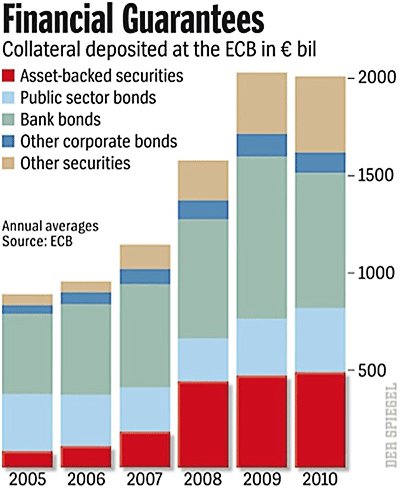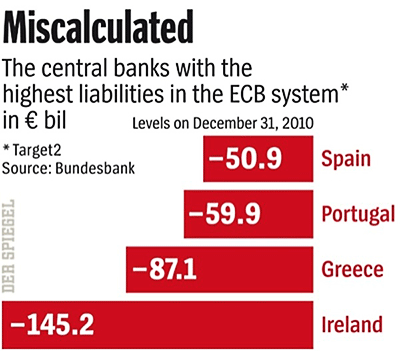The continent’s policy makers will only be able to paper over the problem of bankrupt governments and needy banks for so long, writes John Mauldin in Thoughts from the Frontline.
So much news has come out of Europe recently that has me shaking my head. It is a strange game of brinksmanship they are playing, and it is one we should be paying attention to (as if the brinkmanship played by US politicians over the debt ceiling is not enough).
Last week, one member of the European Central Bank after another repeated the warning that if Greece defaults or restructures its debt, Greek bonds would not be eligible for use as collateral at the ECB, nor would Greek bank debt.
They are continually warning of “contagion risks” and the end of the euro as we know it, and all in stentorian tones that would make any doomsday prophet of Armageddon jealous.
But this ignores reality. Greece simply cannot bear the burden of the debt. Some sort of restructuring or “reprofiling” is clearly going to be needed, if not outright default. There are those in the EU who are recognizing this. Even a Greek EU commissioner (of fishing) noted the problem openly.
Of course, there were quick denials by the Greek government and prime minister that there were even any discussions of leaving the Eurozone, which I find rather odd. I mean, if you are not having discussions about all the options (behind closed doors), you are being derelict in your duties.
Here’s the reality in Europe. Greece and Portugal are effectively shut out of the debt market without EU and ECB loans. Ireland will not be able to (nor should it!) handle the debt it has taken from the ECB to bail out its banks. If they acknowledge that debt, lenders will recognize they cannot service any new debt, and they will be shut out of the debt markets without ECB and EU guarantees.
The International Monetary Fund warned last week it may not continue funding Greek debt in the very near term. Greece might be denied the next tranche of financial aid if an audit of its budget accounting shows that the country cannot guarantee financing for the next 12 months, Eurogroup President Jean-Claude Juncker said Thursday.
This is all brinksmanship. The ECB says Greece will get nothing if they default. The EU says that to get money the Greeks must make even deeper cuts, while a soon-to-be-completed audit will show they are in worse shape rather than improving.
The Greeks, in turn, have an obscure minister who is not part of the government say they might leave the euro. The IMF says they may not fund without further commitments from the euro members, which are going to be tough to get from Germany and Finland, at the least.
The German government has been proposing to fill Greece's finance gap without providing more loans, by asking holders of Greek bonds maturing in the next couple of years to agree to postpone their repayments. Yeah, like that’s going to happen. Let’s depend on the kindness of strangers.
NEXT: Frankfurt, We Have a Problem
|pagebreak|Frankfurt, We Have a Problem
Let’s look at a few graphs from a scathingly critical post in Der Spiegel about the central banks of the various countries in Europe and the ECB itself, which show us why the ECB is so worried about a default.
As it turns out, the ECB would be in worse shape than Lehman was in September 2008. You can read the article here. It is not pleasant reading if you pay taxes in Europe. Especially if you are German.
“While Europe is preoccupied with a possible restructuring of Greece's debt, huge risks lurk elsewhere—in the balance sheet of the European Central Bank. The guardian of the single currency has taken on billions of euros worth of risky securities as collateral for loans to shore up the banks of struggling nations.
“Since the beginning of the financial crisis, banks in countries like Ireland, Portugal, Spain, and Greece have unloaded risks amounting to several hundred billion euros with central banks. The central banks have distributed large sums to their countries' financial institutions to prevent them from collapsing. They have accepted securities as collateral, many of which are—to put it mildly—not particularly valuable.
“These risks are now on the ECB's books because the central banks of the euro countries are not autonomous, but rather part of the ECB system. When banks in Ireland go bankrupt, and their securities aren't worth enough, the euro countries must collectively account for the loss. Germany's central bank, the Bundesbank, provides 27% of the ECB's capital, which means that it would have to pay for more than a quarter of all losses.
“For 2010 and the two ensuing years, the Bundesbank has already decided to establish reserves for a total of €4.9 billion ($7 billion) to cover possible risks. The failure of a country like Greece, which would almost inevitably lead to the bankruptcy of a few Greek banks, would increase the bill dramatically, because the ECB is believed to have purchased Greek government bonds for €47 billion. Besides, by the end of April, the ECB had spent about €90 billion on refinancing Greek banks.” (Der Spiegel)
Two graphs from the article say a lot:
NEXT: What Happens If the Greeks Default?
|pagebreak|What Happens If the Greeks Default?
Andrew Lilico, writing in the Daily Telegraph of London, gives us the answer to that question with a series of bullet points. I might not agree with all of them, but he is looking in the right direction.
“It is when, not if. Financial markets merely aren’t sure whether it’ll be tomorrow, a month’s time, a year’s time, or two years’ time (it won’t be longer than that). Given that the ECB has played the “final card” it employed to force a bailout upon the Irish—threatening to bankrupt the country’s banking sector —presumably we will now see either another Greek bailout or default within days.
“What happens when Greece defaults? Here are a few things:
- Every bank in Greece will instantly go insolvent
- The Greek government will nationalize every bank in Greece
- The Greek government will forbid withdrawals from Greek banks
- To prevent Greek depositors from rioting on the streets, Argentina-2002-style (when the Argentinian president had to flee by helicopter from the roof of the presidential palace to evade a mob of such depositors), the Greek government will declare a curfew, perhaps even general martial law
- Greece will redenominate all its debts into “New Drachmas” or whatever it calls the new currency (this is a classic ploy of countries defaulting)
- The New Drachma will devalue by some 30%-70% (probably around 50%, though perhaps more), effectively defaulting on 50% or more of all Greek euro-denominated debts
- The Irish will, within a few days, walk away from the debts of their banking system
- The Portuguese government will wait to see whether there is chaos in Greece before deciding whether to default in turn
- A number of French and German banks will make sufficient losses that they no longer meet regulatory capital adequacy requirements
- The European Central Bank will become insolvent, given its very high exposure to Greek government debt, and to Greek banking sector and Irish banking sector debt
- The French and German governments will meet to decide whether (a) to recapitalize the ECB, or (b) to allow the ECB to print money to restore its solvency. (Because the ECB has relatively little foreign currency-denominated exposure, it could in principle print its way out, but this is forbidden by its founding charter. On the other hand, the EU Treaty explicitly forbids the form of bailouts used for Greece, Portugal, and Ireland, but a little thing like their being blatantly illegal hasn’t prevented that from happening, so it’s not intrinsically obvious that its being illegal for the ECB to print its way out will prove much of a hurdle.)
- They will recapitalize, and recapitalize their own banks, but declare an end to all bailouts.
- There will be carnage in the market for Spanish banking sector bonds, as bondholders anticipate imposed debt-equity swaps.
- This assumption will prove justified, as the Spaniards choose to override the structure of current bond contracts in the Spanish banking sector, recapitalizing a number of banks via debt-equity swaps.
- Bondholders will take the Spanish banking sector to the European Court of Human Rights (and probably other courts, also), claiming violations of property rights. These cases won’t be heard for years. By the time they are finally heard, no one will care.
- Attention will turn to the British banks. Then we shall see…”
Or the EU can kick the can down the road yet another time, as many expect. The ECB will blink. Some way will be found to find money yet again, and politicians everywhere will pray that something happens that saves the system— like the Greeks suddenly start to pay taxes and Greek and Irish economies start growing 5%.
For the record, there are reportedly massive bank runs in Greece, especially on large uninsured deposits.
NEXT: A Random Walk Through the Minefield
|pagebreak|A Random Walk Through the Minefield
According to Dealogic, European banks have to refinance about €1.3 trillion of maturing debt by the end of 2012. This is the sort of pressure point capable of triggering a liquidity panic unless Euroland policymakers become much more proactive in the interim.
But, as noted, it may take more market stress now to force precisely this sort of policy response. That implies a much greater correction for the euro against the US dollar than what has been seen thus far, and a further correlated sell-off in risk assets, including commodities (CLSA equity strategist Chris Wood, writing in his weekly newsletter Greed and Fear).
There are just so many risks in Europe that it is hard to make a list long enough. I think the risk to the world markets is higher than the subprime risk. I know that the leaders of Europe think they can “contain” the risk. So did Bernanke in the summer of 2007. You cannot contain this until you actually admit the problem.
Our credit institutions are so intertwined that a repeat of the 2008 credit crisis is entirely possible. Who plays the role of Lehman? Let me count the candidates. Greece. Ireland. Portugal. Spain. The ECB. Any number of large European banks with massive Irish exposure.
Greece alone could be dealt with. That is why ECB leaders are right to talk passionately about contagion risks. But ignoring the political realities is not the way to deal with it.
The simple fact is that at some point, whether this year or the next or the next, depending on how long they can kick the can down the road and how long German voters are prepared to bite 27% of the cost (not a given), Greece is going to default.
Maybe the plan of the ECB is to keep financing Greek debt until it is off enough bank balance sheets, and onto the back of the euro through the ECB balance sheet, before they pull the plug.
Whatever the plan is, right now Europe looks like a very dysfunctional family. The potential for a messy divorce is quite real. Can you see Greece or Ireland giving up sovereignty to Brussels? Really? Then you should buy Greek bonds at 24%. They are a steal.
At a minimum, Europe is in for years of expensive “therapy.” And we have not even gotten to their version of their health-care and pension crisis.
The euro appears to me to be a massive short.












